Shooting Of Iranian Student Sparks Controversy

Anahita Amirpour, a 20-year-old student, was shot dead by plainclothes intelligence ministry agents in the city of Borujerd, Lorestan province.

Anahita Amirpour, a 20-year-old student, was shot dead by plainclothes intelligence ministry agents in the city of Borujerd, Lorestan province.
It is believed that Amirpour, a first-semester physical education student at Azad University lost her life when intelligence forces pursued the car she was in. The car's driver, M. Jalayi-far, also a student and Borujerd resident, sustained severe injuries and is currently hospitalized.
Hengaw Human Rights Organization, a Kurdish rights group, says the intelligence forces claim the incident was linked to a recent terror attack in Kerman. Two explosions during the fourth memorial of former IRGC commander Qasem Soleimani on January 3 killed around 90 people in Kerman. The strategy aims to reframe the intentional killing as part of a scripted security case.
It is not clear why the agents tried to stop the car, although some speculate that it could be hijab enforcement related.
Rights group sources indicate that as the plainclothes forces approached the students' car, instructing them to stop and exit the vehicle, the intimidated driver panicked and attempted to flee. Subsequently, the intelligence forces opened fire and seized the car.
Over the past two days, security entities have reportedly pressured the families and friends of the victims not to disclose information about the incident. Two personnel from Chamran Hospital were also summoned and threatened by intelligence authorities.
While security and law enforcement authorities in Borujerd have not issued public statements, Governor Moslem Moradi vaguely referenced the incident, attributing it to recent terrorist attacks and confrontations with criminal elements. Hengaw sources reject Moradi's claims, emphasizing that intelligence forces deliberately targeted the students, leading to Amirpour's death.
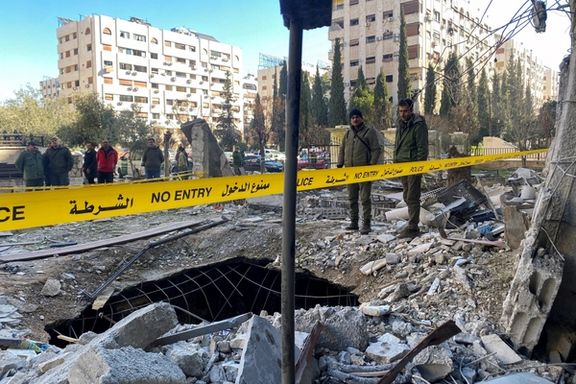
Israeli airstrikes in Syria that killed several IRGC generals have unleashed a barrage of "cutlet" photos online, a popular dish now symbolizing Iran’s slain Guards.
The association started with the targeted killing of former IRGC Quds Force commander Qasem Soleimani, whose body was so mutilated in a US drone strike in 2020 that people described him as a “cutlet,” a popular dish like burgers made of ground beef and potatoes.
Iranian regime opponents observe his death anniversary as "Cutlet Day" on various social media platforms, a symbolic protest act that has seen several people arrested. The recent surge in such surgical strikes has ushered in a "Cutlet Season” as dissident activists took to social media with different photos of cutlets.
On Saturday, the IRGC confirmed that four of its forces lost their lives in the airstrikes on a building in the Mazzeh neighborhood in Damascus. A fifth IRGC officer later succumbed to his wounds and died. Among the dead was Hojatollah Omidvar, also known as Haj Sadegh and Yousef Omidzadeh, who served as the head of the RGC’s extraterritorial Quds force intelligence unit in Syria. According to Iranian state media, Omidvar’s deputy was also killed in the attack.
On December 25, another suspected Israeli airstrike targeted and killed another top Iranian IRGC general, Razi Mousavi, at his residence near Damascus. Additionally, several high-ranking military commanders of Iran-backed militia -- such as Hamas in Gaza, Hezbollah in Lebanon and Harakat Hezbollah al-Nujaba in Iraq – were killed. On Sunday, three more IRGC members were killed in a US-led strike on Houthi rebels of Yemen.
In addition to celebrating “Cutlet Season” and quipping about a more extensive menu by Israeli Prime Minister Benjamin Netanyahu, a photo that is widely circulated is Iran’s Supreme Leader Ali Khamenei surrounded with cutlet patties instead of a group of his inner circle. Another widely shared post is a symbolic weekly schedule of the Supreme Leader, with most of his week spent on funeral prayers for the slain IRGC generals.
The hardline daily Farhikhtegan has published a list of senior IRGC “military advisors” killed since 2015 in Syria, claiming that eight out of the total of 20 have been killed since Iran-backed Hamas started the war against Israel on October 7. The list probably ignored mid-ranking people as it pertains to only seven strikes while Israel has reportedly had around 600 airstrikes since April 2017.
The increasing fatalities among IRGC men have also led to speculations that Israel may have been tipped off about the whereabouts of the targets by Russia. Centrist Aftab News website in Tehran ran an article Sunday -- titled “The coordination between Israel and Russia in Syria is not very hidden” -- citing several Iranian officials and activists who mentioned the alleged coordination.
Lawmaker Mohammad Esmail Kowsari, who is a former IRGC commander, said, “Spies in Damascus must be arrested." Addressing President Ebrahim Raisi, journalist Alireza Mostafa said, “Please ask President Vladimir Putin why the Russian S-400 air defense system is never activated in Syria to protect Iran's interests? Isn’t Russia a strategic ally of Iran?”
According to conservative commentator Sadegh Hosseini, “Since the increased and consolidated presence of Russians in Syria, we have witnessed a rise in Israel’s aerial attacks against Iranian forces. The recent assassinations in Syria underscore the need for a reassessment of Iran-Russia relations in Syria.”
The Islamic Republic's intelligence failures extend beyond overseas operations, evident in the recent twin blasts during Soleimani's death anniversary ceremonies in Kerman. Pointing the finger at Russia while Iranians are mocking IRGC casualties is further proof that Iranians do not take seriously the regime figures who keep threatening Israel with a firm response, but nothing happens.
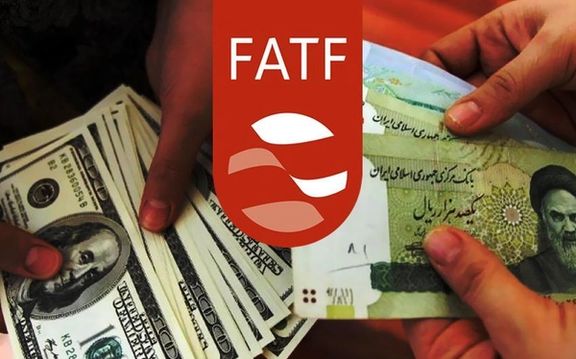
The Iranian government has announced that the International Financial Task Force (FATF) has accepted Tehran’s request to remove Iran from one of its warning categories.
Iran has been on the financial watchdog’s ‘blacklist’ in recent years for not adhering to transparency and international conventions against money laundering and terrorism financing. The Iranian government sent a letter to FATF earlier this month requesting Iran’s removal from its worst category that only two other countries in the world share: Myanmar and North Korea.
According to Iranian state media on Sunday, and an official post on X, the government has received a written response from the head of the FATF, confirming that it has instructed members to remove Iran from recommendation number 7. However, it seems that this does not mean Iran has been removed from the inter-state agency’s blacklist.
Recommendation #7 pertains to non-proliferation only. FATF website describes it as, “FATF Recommendation 7 requires countries to implement targeted financial sanctions to comply with the United Nations Security Council Resolutions (UNSCRs) relating to the prevention, suppression and disruption of proliferation of weapons of mass destructions (WMD) and its financing.”
While this could have affected Iran because of the JCPOA nuclear agreement it concluded with world powers in 2015, and the subsequent UN Security Council Resolution 2231 restricting Tehran’s nuclear activities, Iran’s status on the blacklist is mainly due to its non-compliance with international financial standards.
Despite these preliminary determinations, the issue of the FATF letter allegedly received by Iran remains murky. First, a copy of Iran’s earlier letter to the agency has not been published and it is not clear what Tehran exactly asked FATF. Second, the response Iran says to have received has also not been published as of the time of this report, and it remains unclear what FATF has exactly said.
FATF identifies problematic countries, and high-risk countries, in terms of financial dealings. It lists countries, “with serious strategic deficiencies to counter money laundering, terrorist financing, and financing of proliferation. For all countries identified as high-risk, the FATF calls on all members and urges all jurisdictions to apply enhanced due diligence, and in the most serious cases, countries are called upon to apply counter-measures to protect the international financial system from the ongoing money laundering, terrorist financing, and proliferation financing risks emanating from the country.”
FATF is an international organization formed by G7 member countries to protect the international financial system and its recommendations shape banking policies of most countries and businesses who want to protect their own integrity and reputations. Thus, Iran’s international banking is severely impacted by its status in the FATF blacklist.
To what extent the modification of Recommendation 7, if true, would have a positive impact on Iran remains to be seen. Iranian media presents the FATF letter, as claimed, to be a significant victory for Tehran, but it is too soon to reach a definitive assessment.
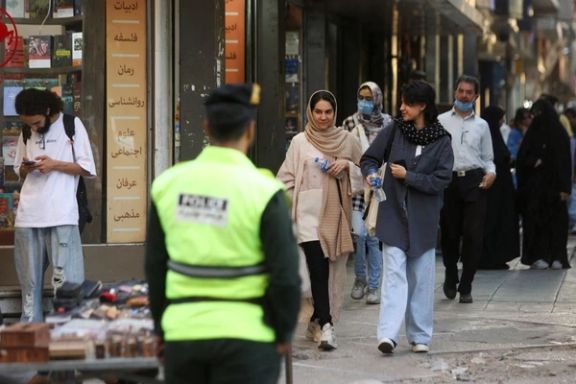
Qom’s police commander says 74,000 text messages have been sent to women in the last 10 months warning them of hijab violations.
Mohammad-Reza Mirheidari highlighted, "The referral of cases to the judicial authorities has increased more than six times compared to last year."
Additionally, he mentioned, "We sealed off nine women's beauty salons, 65 coffee shops, four sports clubs, and nine other complexes."
In recent months, the Tehran police have intensified efforts to curb persistent hijab defiance, leading to the seizure of cars.
Iranian officials have acknowledged the issuance of police warnings through text messages alerting citizens to the imminent seizure of vehicles for non-compliance with compulsory hijab rules.
The police directive reportedly extends to citizens, resulting in the confiscation of hundreds of cars temporarily prohibited from use.
As part of an escalating crackdown on hijab defiance, Iranian parliamentarians have given their approval to the government's Hijab and Chastity bill. The legislation, aiming for stricter penalties regarding hijab infractions, has faced substantial criticism from human rights groups.
The heightened enforcement of hijab regulations follows widespread protests in Iran since the death of Iranian-Kurd Mahsa Amini in 2022. Amini's arrest in Tehran, allegedly for defying the Islamic republic’s mandatory hijab, triggered the most significant uprising in recent history.
Women across the country have been actively challenging the mandatory hijab, resulting in an increased presence of hijab enforcers in public spaces such as subway stations.
Moreover, surveillance cameras have been installed to identify and apprehend individuals violating hijab regulations.

Microsoft has revealed that "high-profile" experts specializing in Middle Eastern affairs are under attack from hackers believed to be linked to the Iranian government.
The entities under attack were located in Belgium, France, Gaza, Israel, the United Kingdom, and the United States.
The Microsoft Threat Intelligence team, in a recent blog post, outlined that since November, a faction of the hacking group Mint Sandstorm has utilized "customized phishing lures to socially engineer targets into downloading malicious files."
The report notes the application of new tools in observed incidents. According to Microsoft, the operators in the Mint Sandstorm subgroup exhibit highly skilled social engineering capabilities, lacking many typical hallmarks that users rely on to identify phishing emails. In some instances, the subgroup used compromised but legitimate accounts to disseminate phishing lures.
Microsoft's findings indicate a correlation between the recent campaign and the ongoing conflict in Gaza, with phishing lures referencing the Israel-Hamas war. The objective is to gather diverse internal perspectives on the conflict.
Mint Sandstorm, also known as APT35 or Charming Kitten, is associated with the Islamic Revolutionary Guard Corps (IRGC), an intelligence arm of Iran's military. The campaign primarily targets people with access to information crucial to Tehran's leadership.
Prior instances involve the group targeting journalists, researchers, professors, and others with resource-intensive social engineering campaigns. Some cases featured legitimate yet compromised email accounts belonging to the impersonated victims.
Initial emails in some instances lacked malicious content as hackers aimed to establish relationships with their targets before initiating espionage processes.
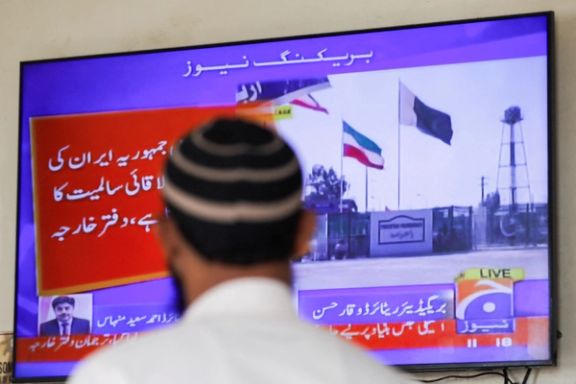
The insurgent Sunni Baluch group known as Jaish al-Adl (Army of Justice) has been a source of tension between Iran and its nuclear neighbor, Pakistan for years.
On the evening of January 16, Iran's Revolutionary Guards (IRGC) launched a missile and drone attack on two alleged Jaish al-Adl bases in Pakistan’s Balochistan Province. Pakistan recalled its ambassador from Tehran and retaliated two days later by conducting airstrikes inside Iranian borders against “terrorists”.
The crisis, which now seems to have been somehow managed by both sides, was unprecedented in the four-decade history of the two Islamic republics' relations because Pakistan had never before taken such military action inside Iranian borders.
Iranian officials have on several occasions in the past decade, including in 2019, complained that Islamabad has taken no action against the members of Jaish al-Adl finding refuge in its territory despite Iran's provision of relevant information including locations of the militants’ hideouts.
The group currently led by Salahuddin Farooqui who is known for his opposition to Iran's support for Bashar al-Assad in the Syrian civil war, fights for an independent Baluchestan consisting of Baluch people on both sides of the Iran-Pakistan border. The militants call Farooqui their “Emir” and “Leader of Baluchestan/Balochistan Jihad”.
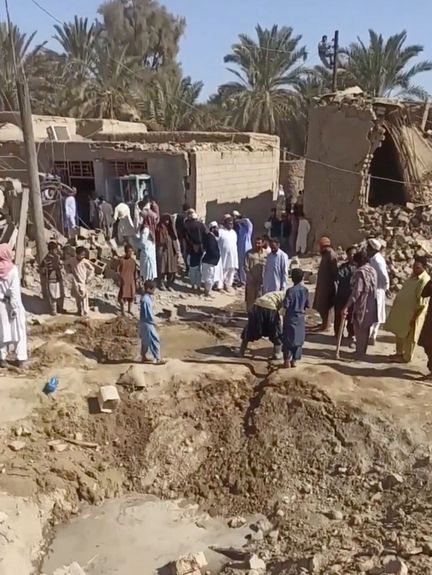
It is hard to say to what extent the group has support within the more than two-million strong Baluch population in Iran, which is the most oppressed and poverty stricken in the country. However, ordinary Baluch seem to be loyal to a charismatic Sunni cleric, Mowlavi Abdolhamid, regularly heeding his calls for peaceful protests against Iran’s Shiite government.
Jaish al-Adl has carried out dozens of large and small operations over the years against Iranian military forces, particularly the IRGC, including cross-border attacks and abduction of border guards and security personnel as well as bombings leading to the killing of civilians.
In a statement on its website (Shabake Adl) on January 16, Jaish al-Adl claimed targeting an IRGC vehicle carrying officers near the city of Iranshahr in Iran's restive Sistan and Baluchestan Province. The statement did not mention any casualties. Two days earlier the group had taken responsibility for an attack on an IRGC base in Saravan and claimed a sentry had been shot. The guards responded to the attack by “shooting aimlessly in various directions”, the group claimed.
Jaish al-Adl has been designated as a terrorist organization by Iran, whose officials often refer to it as Jaish al-Zulm (Army of Injustice) and “Takfiri terrorists.” The United States put the group on its foreign terrorist organizations list in 2010.
Iranian officials often allege that the group has ties with US, Saudi, and Israeli intelligence agencies and is funded by them.
Jaish al-Adl was founded by Abdul Rahim Mollazehi, a Baluch militant, in 2012 by reorganizing Jundullah (Army of God), also known as the People’s Resistance of Iran.
A few months after its emergence, on October 25, 2013, the group ambushed border patrols in Saravan in retaliation for the death sentences passed on 16 Baluch prisoners. Fourteen military personnel were killed, and seven others were seriously injured in the attack. Assailants, Iranian authorities said, fled to Pakistan’s tribal areas after the attack. Iran hanged all the sixteen prisoners the next day, claiming they were affiliated to Jaish al-Adl and other militant groups.
Jundullah, founded by Abdolmalek Rigi in 2002, operated in Iran's Sistan and Baluchestan Province and the adjoining Baluch-majority areas of Pakistan and Afghanistan and mainly demanded justice for the Sunni Baluchi population, and was not an overtly separatist group. Rigi said he considered himself as an Iranian citizen.
The militant group claimed responsibility for several bombings and assassinations such as the killing of 42 including five senior Revolutionary Guards commanders in Pisheen in 2009 but lost much of its power and influence in the region after Iran captured and executed Rigi in 2010. In 2013, Jundullah also claimed responsibility for bombing a church in Peshawar, Pakistan, in 2013 which killed 85.
Iranian authorities claimed that they had forced a commercial airliner flying from Dubai to Bishkek in Kyrgyzstan to land at Bandar Abbas International Airport based on intelligence indicating Rigi was onboard the plane with a forged Afghan passport. They also claimed Rigi had confessed to being in a US military base a day before his arrest.
The state TV showed Rigi being taken by masked commandos from the plane but there were also reports of him having been handed over to Iran by Pakistan and that Iran's claims were only a cover-up of Pakistan’s delivery of Rigi to them.